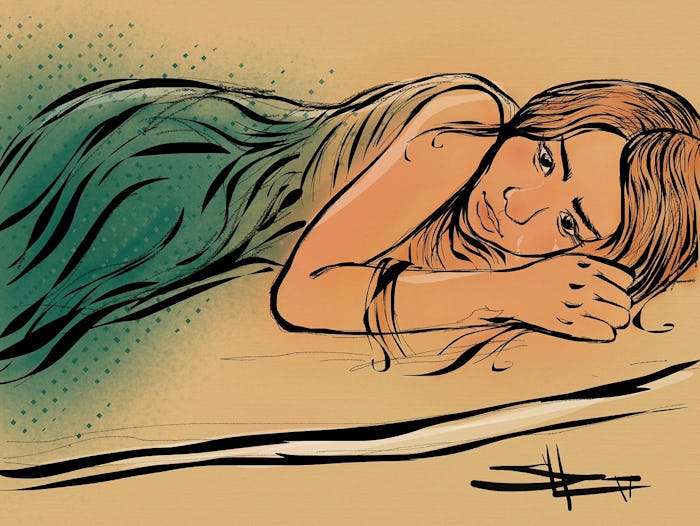Any mother who has suffered with a maternal mental health issue will tell you that perinatal mood and anxiety disorders almost always cause sleep problems. Insomnia is a common side effect of postpartum depression (PPD), but is PPD a side-effect of sleep deprivation? Are there ways that lack of sleep can affect your postpartum depression?
It is hard when you are a tired mom, with all of the normal stresses and worries that come along with having a new baby. In the back of every new mother's mind is the fear that one day she will wake up with PPD. The thoughts are never quite as clear as they are in the middle of the night when your baby is finally asleep and somehow, you have ended up staring at the ceiling. The desperation that comes with being utterly exhausted but unable to fall asleep is unbearable, and can drive anyone to the brink of a breakdown. It's no wonder that mental health experts are now asking if sleep deprivation is as much one of the causes of postpartum depression, as it is one of the effects.
Here are some ways that lack of sleep can affect your postpartum depression.
1It Can Trigger PPD
Research scientist Alice Callahan wrote in The Science of Mom, that many studies show that moms whose babies have sleep problems are at greater risk for postpartum depression. Dr. Christina Hibbert, a clinical psychologist, agreed noting that sleep disturbance has long been associated with perinatal mood and anxiety disorders (PMADs) such as PPD. Kim West, a social worker, wrote on Huffington Post that getting a minimum of five or six hours of uninterrupted nighttime sleep is essential to treat and potentially lower your risk of PPD.
2It Can Worsen PPD Symptoms
Postpartum Progress noted a study published in the Journal of Obstetric, Gynecologic, & Neonatal Nursing which found that depression symptoms worsen in PPD patients when their quality of sleep declines. Moms who suffer with PPD and sleep deprivation can have difficulty caring for their infants as judgment and concentration decline. West noted that other symptoms that can worsen are hopelessness, anxiety, panic attacks, deep sadness, the inability to feel pleasure, anger, and guilt.
3It Can Exacerbate PPD-Related Insomnia
According to Postpartum Living, studies have shown that about 80 percent of women diagnosed with postpartum depression suffer from insomnia. Insomnia can be sparked by frequent interruptions in a person’s sleep routine. Because you are already not sleeping, having to wake up to take care of a baby when you do finally get rest, can make your insomnia worse.
4It Can Cause Physical Fatigue
The combination of PPD and sleep deprivation is a cocktail for exhaustion. When you hear of celebrities being hospitalized for "exhaustion" it's usually fatigue and gastrointestinal distress caused by chronic stress and lack of sleep, according to the Chicago Tribune. Sleep loss and fatigue leads to problems with people's circadian rhythm, which can promote inflammation throughout the body which causes the gastrointestinal issues. Imagine dealing with PPD, sleep deprivation, and GI problems. No fun.
5It Can Require Medical Intervention
According to The Ammon-Pinizzotto Center for Women’s Mental Health at Massachusetts General Hospital, women with postpartum depression who have persistent sleep problems may benefit from pharmacologic consultation. In other words, it might be time for mom to consider taking medication to get some sleep. The Center added that "improving sleep quality and treating postpartum depression will help restore maternal functioning and improve maternal-infant outcomes."
